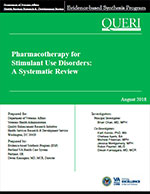
Prepared by:
Evidence-based Synthesis Program (ESP)
Portland VA Health Care System
Portland, OR
Devan Kansagara, MD, MCR, Director
Recommended citation:
Chan B, Kondo K, Ayers C, Freeman M, Montgomery J, Paynter R, and Kansagara D. Pharmacotherapy for Stimulant Use Disorders: A Systematic Review of the Evidence. VA ESP Project #05-225; 2018.
Download PDF: Complete Report, Executive Summary, Report, Appendices
Stimulant use disorders, specifically cocaine and methamphetamine use, present ongoing public health problems in the United States, with major medical, psychiatric, cognitive, socioeconomic, and legal consequences.
Currently there are no accepted FDA-approved pharmacotherapy treatment options available for cocaine or methamphetamine use disorders. Several pharmacotherapies have been proposed as possible experimental interventions to promote reduction in use or cessation. Currently, psychotherapy (including cognitive behavioral therapy, drug counseling, relapse prevention, etc) is offered as the primary treatment for stimulant addiction. In addition, contingency management strategies use incentives to increase engagement in treatment and reduce drug use. In order to guide future research and policy decisions for the Veterans Health Administration (VHA), the Office of Mental Health and the Seattle and Philadelphia Centers for Substance Abuse Treatment & Education (CESATE) asked the Veterans Affairs Evidence-based Synthesis Program (ESP) to provide an up-to-date examination of the benefits and risks of various pharmacologic treatments of stimulant use disorder. Specifically, this review examined 1) the benefits and harms of pharmacotherapy for cocaine use disorder, 2) subpopulations for whom different forms of pharmacotherapy are most/least effective for cocaine use disorder, 3) the benefits and harms of pharmacotherapy for amphetamine/methamphetamine use disorder, and 4) subpopulations for whom different forms of pharmacotherapy are most/least effective for amphetamine/methamphetamine use disorder.
KQ1: What are the benefits and harms of pharmacotherapy for cocaine use disorder?
KQ2: Are there known subpopulations for whom different forms of pharmacotherapy are most/least effective for cocaine use disorder?
KQ3: What are the benefits and harms of pharmacotherapy for amphetamine/methamphetamine use disorders?
KQ4: Are there known subpopulations for whom different forms of pharmacotherapy are most/least effective for amphetamine/methamphetamine use disorder?
Pharmacotherapy for Stimulant Use Disorders: A Systematic Review (Management Brief)
Chan B, Kondo K, Freeman M, Ayers C, Montgomery J, and Kansagara D. Pharmacotherapy for Cocaine Use Disorder—a Systematic Review and Meta-analysis. Journal of General Internal Medicine. Published online June 10, 2019. https://doi.org/10.1007/s11606-019-05074-8
Chan B, Freeman M, Kondo K, et al. Pharmacotherapy for methamphetamine/amphetamine use disorder - a systematic review and meta-analysis. Addiction. Published online first July 22, 2019. https://doi.org/10.1111/add.14755